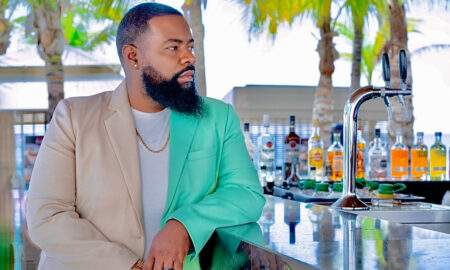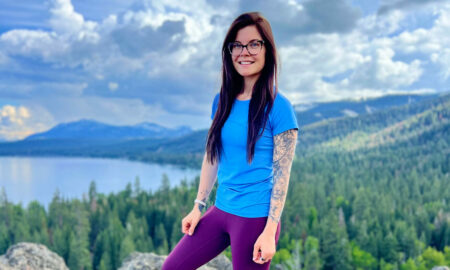 Today we’d like to introduce you to Quinton Lowe.
Today we’d like to introduce you to Quinton Lowe.
Quinton, can you briefly walk us through your story – how you started and how you got to where you are today.
My story is pretty straightforward. I grew up always wanting to be a filmmaker– well that’s not completely true I guess, I actually grew up wanting to be an actor, because naturally, actors are the ones you’re always seeing on the TV screen, so your naive kid brain thinks those are the people who are generating the content.
I actually did a little bit of theater and took a few acting classes, but during my teens, as I researched and learned more about the filmmaking process, it was obvious my intentions aligned more with writing and directing… Plus I’ve never been one for musicals, another reason I didn’t want to stick with acting. In theater, I felt like I was always playing parts like “Elf #3” in a ridiculous Christmas ensemble and would think to myself “If this is what an acting career entails, this isn’t for me.” Of course, that’s not all acting is, but as a kid who was to know!
I always made videos growing up, I first started out shooting with my older brother’s video camera that recorded to DV tape. I lived on a cul-de-sac with three other boys my age, so we ran around shooting goofy stuff and doing weird skits only we found funny. It was kinda cool because we’d edit in camera, if we decided we didn’t like a take or something, we’d just rewind the tape and record over the last bit.
I actually remember the first time I did something that felt like a legit edit, we recorded this long shot of me walking down a hallway where I pretended to slip and fall, then I rewound the footage until just before I pretended to slip and recorded over with a close up of my shoe slipping on a pencil, so when you played it back it went from a medium of me walking down the hall, insert of my shoe, then back to the medium of me slipping. It was so cool. When I got a little older and was in middle school, my Mom bought me a simple digital camera, one where all the controls were automatic, as in you couldn’t dial in the ISO, shutter, or aperture.
If I were to use it now, the lack of control would be torture, but just starting out it was great because it forced me to only focus on composition and using shots that would help tell the story. And because that camera shot digital files, I had to learn to use an NLE to cut everything together. I had a friend in school who also made short videos, and he introduced me to Windows Movie Maker, the free NLE that came with Windows XP. Like the camera, if I were to try and use WMM now the lack of control would be torture, but it was actually a great program to learn on because I was primarily limited to just putting the shots in order, trimming the ends, adding some simple graphics, and layering on some music.
And after shooting so many videos, you really start to learn how shots cut together and how music can help make everything cohesive. From there it was just a matter of application, eventually, your knowledge base grows, you get access to better cameras and computer programs, and you learn more and more how to use the tools at your disposal. I remember a friend of mine asked me once “Hey, how could I learn to make videos” and I said, “It’s easy, just start when you’re 12.” Middle school was also around the time I started writing. I had an English teacher named Mrs. Garland (or is it Ms.? Or Miss? I can never remember).
I was lucky and had her two years in a row. She would often give use writing assignments and allow us to be as creative as we wanted with our short stories. Those were my favorite times in class, I would always try to write the most absurd and often disjointed narratives. After a while though, my stories were gradually becoming less and less disjointed, and I really started figuring out how to write a throughline narrative with an arc. Lots of times, I was even writing at home, outside of the class assignments just for the pure joy of it, not realizing I was in the process of finding my career of choice.
I remember my Mom buying this leather bound journal and saying to me “I only want you to write in this when you start writing more seriously.” At the time I didn’t understand what she meant by that, I just found writing as something fun to do, it was just a hobby, but in hindsight, it’s funny how she recognized my enthusiasm for it even before I did. I’d say in high school is when I started to become educated about film. I saw Fight Club for the first time when I was 16, and it changed my life. Here was a movie I felt represented my own male angst and life sensibilities. It had such a unique style and was the first time I felt I could recognize a director’s hand on the material.
I quickly checked out Fincher’s other work: Se7en, Panic Room, The Game. There was a throughline style in all his films I could recognize, and I quickly became obsessed with his work. Being introduced to Fincher’s filmography was my transition from being a passive audience member to focusing on movies as “film.” Fight Club also introduced me to Chuck Palahniuk. Palahniuk changed my perception for what a novel could do with storytelling, so between Fincher and Palahniuk I found the two storytellers that put me on the path for the kinds of films I wanted to make and have influenced me more than any other artists.
I wasn’t long before I was getting into other filmmakers such as Aronofsky, Wes Anderson, Stanley Kubrick, Tarantino, The Coens… Fight Club still remains my favorite movie of all time, and Fincher, my favorite director. After high school, I took two semesters of a film course at San Jacinto Community College, but I quickly decided “film school” was not for me.
However, my instructor was big on getting education out in the field, so through that course I got on my first film set, a low-budget horror comedy which I’m grateful for because that job lead to me getting on two more movies as a production assistant, and before I knew it I was making great connections and getting recommended for more production jobs. I’ve been freelancing full time for a few years now, mostly working as a PA, grip, and video editor.
When I’m not on set I focus on making my own projects as a director. I try to write at least two hours a day and to always have a script I’m working on. Almost all my work comes from recommendations and word of mouth. I have a great connection of filmmaking friends I’ve met over the years I can really depend on, and we’re constantly helping each other out with projects.
Overall, has it been relatively smooth? If not, what were some of the struggles along the way?
I’d say it’s been mostly smooth, to be honest. I mean, being a self-employed freelancer is hard to make a living at in general because you never know for sure where the next paycheck is coming from or when. But even when work gets slow I try to use that time to self-educate, watch films, and write scripts, so no time is wasted. I’d say my only true struggles (woe is me as an artist) are the moments where I feel immense self-doubt.
I worry how I can continue to make a living at this, I often wonder if I’m working hard enough or doing the right things, I worry about not ever being able to reach the place I’m aiming for in my career, and I’m always questioning whether my work is good enough as a creative. But I have to remind myself you only become successful by perseverance, I just have to continue to improve, make great connections, and hope one day luck strikes where preparation meets opportunity.
We’d love to hear more about what you do.
I try to learn and understand all the technical aspects of video/film production to even better my creativity and better organize and understand the workflow of production that’s so important. I love everything about video production and filmmaking. I love that film and video involves so many other artforms and fulfills me creatively. I love that it includes non-art related aspects that betters my knowledge as an individual; filmmaking forces me to learn and be organized as well as motivates me to research and learn things about science and technology I otherwise wouldn’t get to apply with an average career in another field.
Currently I’m putting a lot of effort into being the best screenwriter I can be. I try to write every day. Because I believe if you can craft a great story on the page, directing just becomes an extension of telling that story. In addition, I spend a lot of time studying the gear and technical aspects of filmmaking because I want to be able to understand the tools and know how I can utilize them to better tell my stories. I try to get on as many sets as possible in whatever capacity (whether it be PA, grip, boom op, etc.) in order to see other people’s workflow and get familiar with on-set operations, as well as try to witness and understand what each crew member does. For every project I’ve directed (which has been very few) I’ve also been the writer, editor, sound designer, colorist, and handled all the prep myself because I want to understand the workflow of making a project from beginning to end, and when I get enough resources and/or money to outsource these positions, I can talk those people’s language and have a better understanding of how to communicate what I want to see on the screen (or hear), as well as being able to understand what they’re saying to me in terms of suggestions or limitations. Saying I want to be a director isn’t just a flippant statement for me like I think it is for a lot of people, I understand it carries a lot of weight, and I treat it as such.
What is “success” or “successful” for you?
For me personally, two things define my success (not necessarily in this order):
1. Making a living working in the industry.
2. My work as a writer/director being recognized by audiences.
I remember telling a friend of mine once I won’t feel I’ve truly succeeded until I walk into a cafe and overhear a group of people who don’t recognize me openly discussing one of my films.
Because that would mean two things: 1. I made a film with enough intelligence and enough layers it’s worth discussing and 2. I’ve made something that’s found its way into our society and hopefully becomes a permanent part of the cultural zeitgeist where it can continue to have a life of its own. To me, that’s true artistic success.
Contact Info:
- Phone: 8326477033
- Email: quintonlowe@rocketmail.com
- Instagram: @qlowe11
- Facebook: facebook.com/qlowe11








Image Credit:
Gavin Wegener
Getting in touch: VoyageHouston is built on recommendations from the community; it’s how we uncover hidden gems, so if you know someone who deserves recognition please let us know here.

















